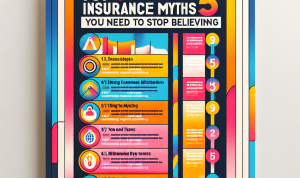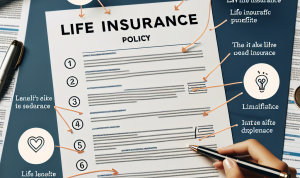Digital Insurance – We’re living in a time where nearly everything is going digital—our shopping habits, how we work, how we socialize. So, it only makes sense that insurance is also evolving in the digital space. When I first heard about “digital insurance,” I thought it was just a buzzword, something tech-savvy marketers were tossing around to make insurance sound more modern. But after digging into it a bit, I realized this is much more than a marketing gimmick. In fact, by 2025, digital insurance could completely reshape the way we think about and use insurance.
Now, let’s be clear: traditional insurance is not going anywhere. But the way we access, interact with, and even purchase insurance is about to get a whole lot more streamlined and efficient. I’ve personally experienced some of these changes, and let me tell you, the shift is already starting. Here’s what you can expect from the rise of digital insurance by 2025.

The Rise of Digital Insurance: What to Expect in 2025
1. The Shift to Fully Digital Insurance Policies
Remember the old days when you had to go through mountains of paperwork to get an insurance policy? It could take weeks to get everything sorted, and there was always some fine print that made your head spin. I know from personal experience—when I bought my first car, I spent hours talking to agents, filling out forms, and then waiting to get my policy in the mail. Well, that’s already changing. Digital insurance allows you to bypass all that hassle and manage everything right from your phone or computer.
By 2025, we’ll likely see an even bigger shift toward fully digital insurance policies. From applying for coverage to managing claims, it’ll all happen with just a few clicks. Some companies are already offering fully online sign-ups, where you fill out a simple form, upload documents, and voilà, your policy is ready. No need for face-to-face meetings or waiting for a physical document to arrive.
This move to digital is especially useful for millennials and Gen Z, who are used to handling everything online. They expect instant access to information and seamless experiences, and insurance is no different. In fact, I’ve already started using an app to track my car insurance, and it’s made life so much easier. I don’t need to remember the policy number or keep any papers—everything is right there, updated in real-time.
2. AI and Chatbots Will Revolutionize Customer Service
Anyone who’s ever called an insurance company knows the struggle of waiting on hold for what feels like an eternity. But here’s the thing: By 2025, artificial intelligence (AI) and chatbots will be doing a lot of the heavy lifting when it comes to customer service. These tools will be able to answer questions, process claims, and even help you choose the right policy for your needs.
Personally, I’ve already interacted with chatbots on a few insurance websites. It’s still in its early stages, but the experience was surprisingly smooth. I was able to get my questions answered instantly without having to wait in a queue. And that’s the key: speed and efficiency. In the next few years, AI will become more advanced, and these bots will be able to handle more complex requests, like processing claims or helping with policy changes.
Now, I know some people are wary of dealing with robots, but trust me, it’s going to make life easier. I’ve been in situations where I needed an answer fast—like when I needed to change my renter’s insurance coverage—and chatting with a bot was way quicker than waiting for an agent.
3. Personalization of Insurance Plans Through Data
Here’s where things get interesting: Digital insurance will use data to personalize coverage. Insurance companies will have access to more data than ever before, from driving habits (thanks to telematics) to lifestyle information (like how much time you spend on the road, your health history, and even the kind of car you drive). This will allow insurers to offer more customized plans that fit your specific needs.
I know, it sounds a little creepy, right? But hear me out. The idea is that with more data, insurers can offer you better, more tailored coverage at a price that actually makes sense for you. For example, if you rarely drive your car, you might be able to get a lower rate by opting into a “pay-per-mile” plan. Or if you lead a healthy lifestyle, you might receive discounts on life or health insurance policies.
I was skeptical at first—how could they possibly understand my needs just by looking at my data? But then I used a usage-based insurance plan for my car and realized how much I was saving by only paying for the miles I drove. It felt like I was finally getting coverage that actually reflected my lifestyle.
4. Smarter Claims Processing
If you’ve ever filed an insurance claim, you know how tedious the process can be. There’s a lot of back and forth, paperwork, and sometimes, delays. But with the rise of digital insurance, claims will become much easier to process, thanks to automation and AI. In the near future, you could file a claim on your phone, snap a photo of the damage, and get reimbursed without ever speaking to an agent.
I remember filing a claim for a small accident I had a while back—it took weeks for the claim to go through, and I felt like I was constantly chasing down updates. With digital insurance, that entire experience will be streamlined. AI will be able to analyze photos of the damage, assess the situation, and approve claims on the spot. For someone who hates waiting for anything, this sounds like a dream come true.
5. More Inclusive Insurance Options
One of the things I’m most excited about is how digital insurance could bring more inclusive options to the table. Traditional insurance systems often have rigid criteria, and it can be hard for people with unconventional needs—like freelancers, gig workers, or people in non-standard employment—to find affordable coverage. But digital insurance can cater to these groups by offering flexible plans that fit their unique situations.
For example, I know a few people who work as freelancers and have struggled with finding proper health or life insurance. But with digital tools and customizable plans, it’s becoming easier for them to get coverage without the hassle of jumping through bureaucratic hoops.
By 2025, we’ll likely see more inclusive, flexible insurance options tailored to the growing number of gig and freelance workers. Whether it’s on-demand insurance for short-term needs or customized health insurance, digital platforms will make it easier for people to get the coverage they need without all the red tape.
6. The Role of Blockchain in Insurance Security
Lastly, let’s talk about security. As we move toward a more digital future, one concern that often comes up is data privacy. With all the sensitive personal data floating around, how do we ensure it’s protected? Enter blockchain technology. By 2025, we’ll likely see insurance companies adopting blockchain to improve security, transparency, and reduce fraud.
I know blockchain is one of those buzzwords that can sound confusing, but the idea here is simple: it creates a secure, tamper-proof system to store and share data. In the insurance industry, this could mean that your personal information and claim history would be stored safely, and you wouldn’t have to worry about data breaches.
So, there you have it. By 2025, digital insurance will completely change the game. From personalized policies and smarter claims processing to more inclusive options and improved security, this evolution is something to look forward to. I can’t say I’m going to miss the old days of endless paperwork and slow claims processes—digital insurance is the future, and it looks pretty exciting.



